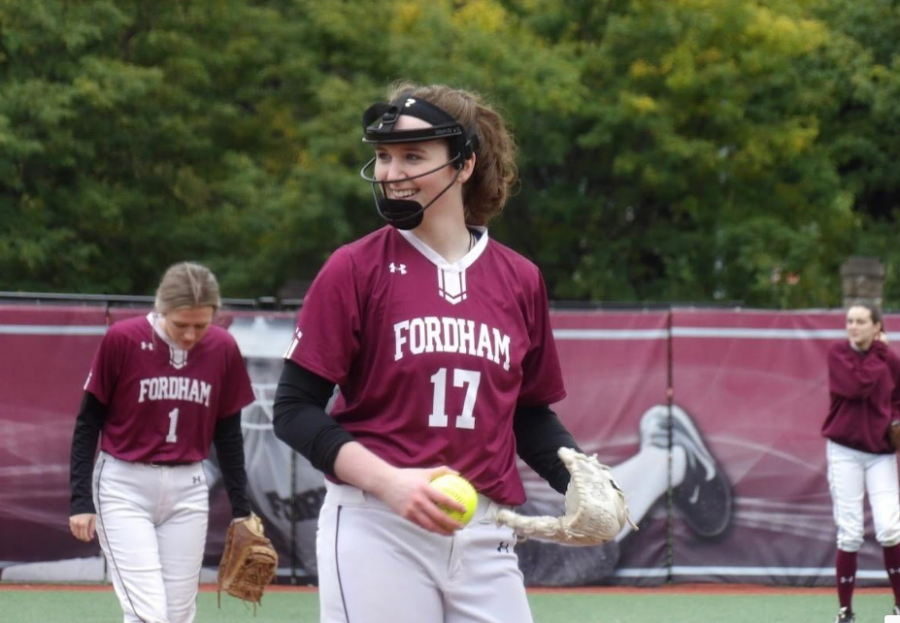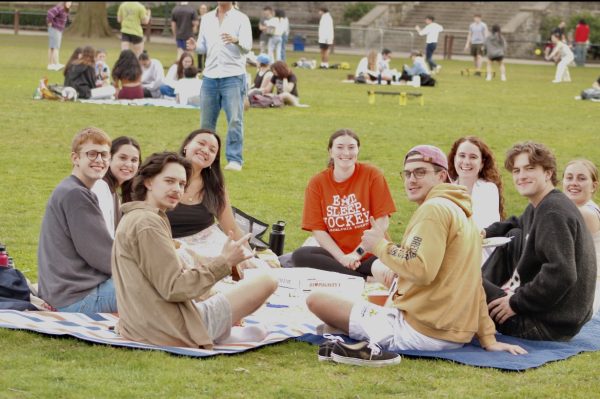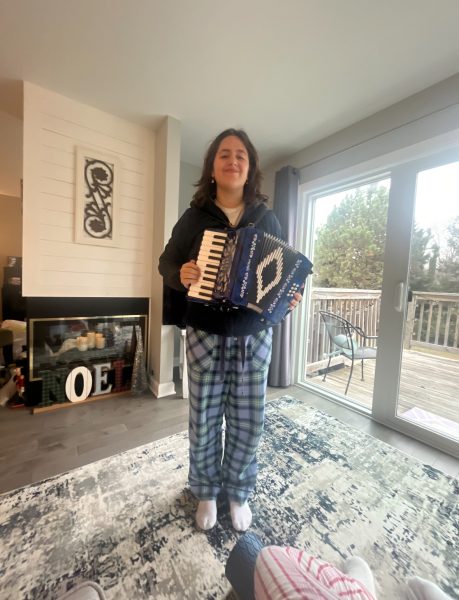Sophomore Continues Family Legacy at Fordham
Glass balances being a Division I athlete while pursuing her passion for neuroscience. (Courtesy of Valerie Glass)
Living just 20 minutes away from Fordham University in Fort Lee, New Jersey, Valerie Glass, FCRH ’24, never expected to attend college so close to home. She was ultimately drawn to Fordham by alumni in her family. Glass’ grandmother, Mercedes Perez, graduated from FCRH in 1954. Glass said, “By being in the same place my grandmother was when she was my age, I feel so much more connected to her.” Seventy years has passed, but the two were led to the same place, where Glass can now follow in the footsteps of her grandmother.
At Fordham, Glass doesn’t shy away from campus involvement. She is a member of club softball, Best Buddies, intramural volleyball and is a writer here at The Fordham Ram. When I met Glass in the first month of my freshman year, she was as much of a social butterfly as she is today. She goes out of her way to make new friends in every activity she does, and never turns down a chance to step out of her comfort zone and try something new.
If she isn’t spending time at her extracurriculars or with friends, the next best place to find Glass is in her Walsh apartment, taking up the entire dining room table with studying materials. Glass is an integrative neuroscience major with a cognitive concentration. She was drawn to this field because she’s always been interested in human behavior and, in her words, “trying to find out what makes people tick and what gets them through the day.” Anyone can see how passionate she is about her major just by the way she talks about it.
When telling me why she’s so intrigued by neuroscience, she explained, “Psychology helps us understand human emotions such as happiness, fear and anxiety, but neuroscience takes it a step further by examining the chemical reactions and neuron firings that cause those feelings.” The research aspect of neuroscience also interests Glass because she feels that by learning about how the brain works, we can progress to help people with disabilities and become more informed about potential solutions.
Although she doesn’t have a specific dream job, Glass knows she wants to be involved in some aspect of patient care, whether that be in a hospital, doctor’s office or mental health facility. This career aspiration is partly due to her mother, who has worked in a hospital for upwards of 30 years as a respiratory therapist. Glass has always admired her mom, sharing that “she could have a million things on her plate and somehow she’ll still get it all done with a smile.” She went on to explain that hearing her mother’s experiences in the hospital and how much she’s impacted the lives of patients was something that always stuck with Glass growing up.
Her dad has also shaped her passion for the patient care industry: he never seemed to give up and always worked towards what he wanted. These values from both of her parents were instilled into Glass growing up and has fueled her passion for STEM.
Getting a degree in neuroscience at an acclaimed university like Fordham has its challenges and benefits. To Glass, the most challenging part about her major is the workload. She explained, “It’s not necessarily dealing with a million tasks, but more of the fact that if you want to do well you need to master time management and study for everything a week ahead of time.” She went on to say how it can be a struggle to develop that mindset, and in order to do well you have to put the work in — if you don’t, it shows.
With that being said, there are definitely parts to the field that she loves and keeps her motivated to push through the not-so-fun parts. Glass finds the material within STEM to be incredibly interesting, especially how it pertains to the human body. As she’s going about her day, she’ll do something and realize that she learned about it in class, which she finds fascinating. She also explained how although it can be challenging, she invites and even enjoys that challenge. “I feel like I constantly need to be preoccupied with something,” she explained. “I like always doing something because it keeps me involved and interested.”
Neuroscience surely takes up a lot of Glass’ time, but the other large part of her days are allocated to playing softball. She started when she was just six years old and went on to start on the varsity team in high school as a freshman. Once she came to Fordham, Glass didn’t initially expect to continue her involvement in softball. However, she soon realized with the heavy commitments that her STEM major requires, she needed to find a way to dedicate her energy to outside of academics. “Due to the devotion required to maintain a neuroscience major, it’s easy to just stay in for the night and spend all of your time studying,” she said. Glass wanted to push herself to keep doing the extracurriculars she enjoyed in high school, which meant she had to start prioritizing softball.
When asked what her favorite part about playing softball at Fordham is, Glass’ face lit up right away. She talked about how all of the girls on the team are supportive and welcoming, and that they create an open, non-judgmental environment. She feels no pressure on the field and loves that all she has to do is show up, do what she can and have fun. At the club fair as a freshman, Glass was immediately greeted by two captains running the club softball stand, and since they were so nice to her she decided it couldn’t hurt to try out for the team. Glass explained how going to practice can brighten up her day right away and how great it can feel to have another group of people in your circle, even just to see around campus.
For the upcoming spring 2022 season, Glass will serve as the vice president of club softball. Some of her responsibilities will include organizing and running practices, managing the distribution of equipment, creating lineups for games and maintaining good morale and a positive team atmosphere.
Although Glass’ top commitments are vastly different from one another, they interact in a way that helps her develop better life skills. She explained that the mindset she gained through playing softball for 13 years really helps her excel in academics and strengthens her persistence to stay committed to a task. Glass said, “By gaining a mindset of working well under pressure and not giving up through softball, I often apply it to my studies in STEM by telling myself I’ll study for five hours and not go back on that.” She feels that by starting sports at a young age, she has gained years of experience in time management, prioritizing the right things and mastering the balance between school, sports and social activities. By continuing her involvement in softball in college, she has developed these skills even further and can now apply it to her neuroscience studies.
Ava Carreiro is a senior from New Providence, N. J., majoring in marketing. She began her time at the Ram in fall 2021, served as Digital Producer for...













































































































































































































